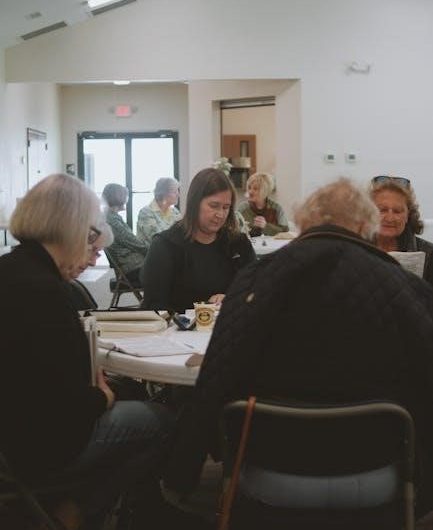
The 8th Edition of Becoming a Helper by Marianne Schneider Corey and Gerald Corey is a comprehensive guide for those entering helping professions. It addresses anxieties and uncertainties, offering insights into the stages of the helping process and essential skills for success. Available in print and digital formats, including PDF, this edition is a must-read for students and professionals seeking to enhance their effectiveness in the field. It combines practical advice with real-world examples, making it an invaluable resource for personal and professional growth.
Overview of the Book
Becoming a Helper, 8th Edition by Marianne Schneider Corey and Gerald Corey is a concise guide designed for individuals exploring or entering the helping professions. The book provides a clear overview of the helping process, focusing on stages such as initiation, exploration, and termination. It addresses common struggles, anxieties, and uncertainties faced by new helpers and offers practical advice for personal and professional development. Available in print, digital, and PDF formats, the text emphasizes essential skills, cultural competence, and ethical considerations. It serves as a foundational resource for students and professionals seeking to enhance their effectiveness in counseling, social work, and related fields.
Importance of the Helping Professions
The helping professions play a vital role in addressing human needs and fostering positive change. They encompass fields like counseling, social work, and human services, which are crucial for supporting individuals, families, and communities. The 8th Edition of Becoming a Helper highlights the significance of these professions in promoting mental health, resilience, and well-being. By equipping helpers with essential skills and knowledge, the book underscores the impact of compassionate and ethical practice. As society faces growing challenges, the demand for skilled helpers continues to rise, making their role indispensable in creating a more supportive and inclusive world.

Authors and Their Expertise
Marianne Schneider Corey and Gerald Corey, renowned experts in counseling and human services, bring decades of academic and practical experience to Becoming a Helper. Their expertise spans teaching, writing, and real-world practice, equipping them to address the challenges of the helping professions with depth and insight. Published by Cengage Learning, their work remains a cornerstone for students and professionals alike.
Marianne Schneider Corey
Marianne Schneider Corey is a distinguished author and expert in the field of counseling and human services. Alongside her husband, Gerald Corey, she has co-authored numerous influential books, including Becoming a Helper. Her work focuses on the practical and ethical aspects of helping professions, drawing from her extensive experience in teaching and practice. Marianne’s contributions have significantly shaped the education and training of helpers, emphasizing the importance of personal growth, cultural competence, and ethical practice. Her insights are invaluable for students and professionals navigating the complexities of helping others effectively and compassionately.
Gerald Corey
Gerald Corey is a renowned author, counselor, and educator with extensive experience in the helping professions. He has co-authored Becoming a Helper with his wife, Marianne Schneider Corey, focusing on the challenges and rewards of counseling and human services. Gerald’s expertise spans group counseling, ethical issues, and personal growth, making him a respected voice in the field. His work emphasizes the importance of self-awareness, cultural sensitivity, and ethical decision-making for helpers. Through his writings, Gerald has inspired countless students and professionals to embrace their roles with compassion and professionalism, fostering meaningful change in the lives of others.

Book Structure and Content
Becoming a Helper 8th Edition is structured to guide readers through the helping process, covering essential skills, cultural competence, and ethical considerations. The book is divided into chapters that explore key topics, providing a clear roadmap for developing proficiency in the helping professions. Supplementary resources, such as study guides and online tools, enhance learning and application of the concepts discussed.
Chapters and Key Topics
Becoming a Helper 8th Edition is organized into chapters that explore the core aspects of the helping professions. Key topics include the stages of the helping process, essential skills for effective practice, and cultural competence. The book begins with self-assessment tools to help readers determine their suitability for the field. Subsequent chapters cover building rapport, ethical guidelines, and addressing diversity. Practical case studies and exercises are included to enhance understanding. The final chapters focus on professional development and maintaining resilience in the profession. The PDF edition retains all these features, ensuring accessibility and convenience for learners.
The Helping Process: Stages and Skills
Becoming a Helper 8th Edition provides a detailed exploration of the helping process, breaking it down into key stages: initial assessment, exploration, intervention, and termination. Each stage is accompanied by practical skills, such as active listening, empathy, and goal-setting. The authors emphasize the importance of cultural competence and ethical practices throughout the process. The PDF edition maintains clear formatting, ensuring readability and accessibility. By focusing on both theoretical and practical aspects, the book equips readers with the tools needed to navigate the helping process effectively, making it an essential resource for both students and professionals.
Target Audience
Students in Helping Professions
This edition is ideal for students pursuing careers in counseling, social work, or human services. It provides foundational knowledge and practical skills essential for their professional development.
The 8th Edition of Becoming a Helper is specifically designed for students in helping professions, offering a comprehensive guide to navigate the challenges of their field. It addresses common anxieties and uncertainties, providing practical advice and real-world examples to enhance their skills. The book covers the stages of the helping process, equipping students with the knowledge and confidence needed to succeed. Available in various formats, including PDF, it caters to different learning preferences, making it an essential resource for those pursuing careers in counseling, social work, or human services.
Individuals Considering a Career in Helping Fields
The 8th Edition of Becoming a Helper is an essential resource for individuals contemplating a career in helping fields. It offers a clear overview of the helping process, addressing common concerns and uncertainties. The book equips aspiring helpers with the necessary skills and knowledge to succeed, providing real-world insights and practical advice. Available in formats like PDF, it’s accessible to those exploring this path, helping them make informed decisions about their future in the helping professions.

Skills and Knowledge for Helpers
The 8th Edition emphasizes essential skills like active listening, empathy, and cultural competence. It provides practical advice and real-world examples to build confidence and effectiveness in helping roles.
Essential Skills for Effective Helping
The 8th Edition highlights critical skills for helpers, including active listening, empathy, and cultural sensitivity. It emphasizes the importance of self-awareness, boundary setting, and effective communication. The book guides readers in developing these skills through practical exercises and real-life scenarios, ensuring they can navigate the helping process confidently. By fostering trust and understanding, these skills enable helpers to build strong, ethical relationships with clients. The edition also explores how these skills evolve with experience, helping professionals grow in their roles and adapt to diverse client needs.
Knowledge Required for the Profession
The 8th Edition emphasizes the foundational knowledge needed for effective helping, including theories, practices, and ethical guidelines. It covers understanding human behavior, developmental stages, and cultural diversity. The book also highlights the importance of staying informed about evidence-based practices and current trends in the field. By providing a solid knowledge base, it prepares helpers to address diverse client needs and navigate complex situations. This edition ensures that professionals are well-versed in the principles and frameworks necessary for competent and compassionate practice, fostering a deeper understanding of the helping relationship and its ethical dimensions.

Challenges in the Helping Professions
The 8th Edition highlights common struggles, such as managing anxieties, ethical dilemmas, and cultural sensitivity. It also addresses challenges like building trust and handling uncertain outcomes effectively in practice.
Common Struggles Faced by New Helpers
New helpers often face struggles such as managing anxieties, self-doubt, and uncertainties about their effectiveness. Building trust with clients and navigating ethical dilemmas are common challenges. Many struggle with balancing empathy and professional boundaries, as well as handling diverse client needs. The 8th Edition addresses these issues, providing practical advice and real-world examples to help novices build confidence and competence. It emphasizes the importance of self-awareness, continuous learning, and seeking supervision to overcome these challenges and grow as professionals in the helping fields;
Addressing Anxieties and Uncertainties
The 8th Edition of Becoming a Helper acknowledges the anxieties and uncertainties many new helpers face. It provides strategies to manage self-doubt and build confidence. The book emphasizes the importance of self-awareness, empathy, and understanding professional boundaries. Practical advice is offered to navigate ethical dilemmas and cultural differences. By focusing on the stages of the helping process, the authors help novices develop a clear understanding of their role. Real-world examples and guidance on seeking supervision further support helpers in overcoming initial fears and uncertainties, fostering a strong foundation for effective practice.

8th Edition Highlights
The 8th edition offers updated content, new features, and a focus on modern helping practices, ensuring relevance and effectiveness for contemporary helpers.
New Features and Updates
The 8th edition introduces enhanced digital resources, revised case studies, and expanded coverage of cultural competence. New chapters focus on emerging issues in the helping professions, offering practical tools and updated research to aid learners. The eBook version includes interactive elements, while the print edition provides clear outlines and focus questions for better retention. These updates ensure the text remains a leading resource for both students and professionals, addressing current challenges and opportunities in the field. The revisions emphasize hands-on learning, making the content more accessible and applicable to real-world scenarios.
Relevance to Modern Helping Practices
The 8th edition of Becoming a Helper aligns with contemporary practices by addressing current trends and challenges in the helping professions. It emphasizes cultural competence, ethical standards, and the integration of technology in practice. The text also highlights the importance of self-care and burnout prevention, reflecting modern concerns for professionals. With a focus on evidence-based approaches, the book equips readers to navigate diverse client needs and complex societal issues effectively. Its updated content ensures relevance for today’s helpers, making it a vital resource for both education and ongoing professional development in the field.

Becoming an Effective Helper
Becoming a Helper guides readers through the stages of the helping process, emphasizing essential skills like active listening and empathy. It fosters cultural competence and ethical practice.
Personal Characteristics of Successful Helpers
Successful helpers possess empathy, self-awareness, and a genuine interest in others. They maintain healthy boundaries while being culturally sensitive and nonjudgmental. The ability to reflect feelings and thoughts accurately, along with active listening, fosters trust. Helpers must also manage their own emotions and biases, remaining adaptable to diverse client needs. Personal resilience and a commitment to lifelong learning are essential. These qualities, emphasized in the 8th Edition, enable helpers to navigate challenges effectively, ensuring ethical and compassionate support. Developing these traits is crucial for building strong, transformative helping relationships.
Professional Development and Growth
Professional development is crucial for helpers to stay effective and adaptable. The 8th Edition emphasizes the importance of ongoing education, self-reflection, and skill refinement. Helpers must engage in lifelong learning to remain current with best practices and ethical standards. Supervision, mentorship, and peer support are vital for growth. Regular self-care practices help mitigate burnout, ensuring long-term resilience. By committing to continuous improvement, helpers enhance their ability to serve diverse populations effectively. This dedication fosters a fulfilling and impactful career in the helping professions, as highlighted in the text.
Ethical Considerations
Ethical guidelines are fundamental in helping professions, ensuring respect, confidentiality, and informed consent. The book emphasizes the importance of maintaining trust and upholding professional standards in all interactions.
Ethical Guidelines in Helping Professions
The Becoming a Helper 8th Edition emphasizes adherence to ethical guidelines, such as confidentiality, informed consent, and respect for diversity. These principles ensure trust and professional integrity, crucial for effective helping relationships. The book also discusses avoiding harm and maintaining professional boundaries, guiding helpers to navigate complex ethical dilemmas. By prioritizing these standards, professionals can foster a safe and supportive environment for clients, aligning with the ethical frameworks of counseling and human services. The text provides practical examples and case studies to illustrate how these guidelines apply in real-world scenarios, reinforcing their importance in daily practice.
Building Trust and Confidentiality
Building trust and confidentiality are fundamental to effective helping relationships, as emphasized in the Becoming a Helper 8th Edition. Trust is established through empathy, active listening, and genuine concern for clients’ well-being. Confidentiality ensures that clients feel safe sharing personal information, knowing it will not be disclosed without consent. Professionals must communicate clearly about boundaries and exceptions to confidentiality, such as legal obligations to report harm. By upholding these principles, helpers create a secure environment where clients can explore their challenges openly, fostering deeper connections and more meaningful progress in the helping process.

Cultural Competence
Cultural competence involves understanding and respecting diverse backgrounds, fostering inclusivity, and adapting practices to meet the unique needs of all clients effectively and sensitively.
Understanding Diversity in Helping Relationships
Understanding diversity is crucial for effective helping relationships, as it allows helpers to recognize and respect clients’ unique cultural backgrounds, values, and experiences. This involves acknowledging the impact of cultural differences, personal biases, and systemic inequities on clients’ lives. By fostering an inclusive and nonjudgmental environment, helpers can build trust and rapport, ensuring that their interventions are culturally sensitive and relevant. The 8th Edition emphasizes the importance of self-awareness and empathy in navigating diverse client perspectives, ultimately enhancing the effectiveness of the helping process for individuals from all walks of life.
Culturally Sensitive Practices
Culturally sensitive practices are essential in the helping professions, as they ensure that interventions are tailored to clients’ unique cultural contexts. Helpers must adapt their strategies to respect diverse values, beliefs, and communication styles. This involves being aware of one’s own cultural biases and actively seeking to understand the client’s perspective. The 8th Edition of Becoming a Helper provides practical strategies for fostering cultural competence, emphasizing the importance of empathy and adaptability. By integrating culturally sensitive practices, helpers can create an inclusive and equitable environment, ultimately enhancing the effectiveness of their work with diverse populations and promoting positive outcomes.

Resources for Learners
Students using Becoming a Helper 8th Edition benefit from study guides, supplements, and online resources. Access digital tools, PDF downloads, and additional materials through Cengage Learning platforms.
Study Guides and Supplements
The 8th Edition of Becoming a Helper is supported by a range of study guides and supplements designed to enhance learning. These include instructor resources like the Instructor’s Resource Manual, featuring test banks, PowerPoint slides, and lecture outlines. Students benefit from worksheet exercises, discussion guides, and case studies that reinforce key concepts. Additional digital supplements, such as interactive quizzes and video resources, are available through Cengage Learning platforms. These tools help students engage deeply with the material, while also aiding instructors in delivering effective courses. Together, they create a comprehensive learning experience tailored to the needs of those entering the helping professions.
Online Resources and Tools
The 8th Edition of Becoming a Helper is complemented by a variety of online resources and tools. These include eTextbook access through platforms like VitalSource and Cengage Unlimited, allowing users to study digitally. Additionally, interactive quizzes, video resources, and downloadable worksheets are available to enhance learning. The book’s publisher also offers online instructor resources, such as PowerPoint slides and test banks, to support educators. These tools provide flexible and engaging ways for students to master the content, whether they are studying independently or participating in classroom activities. The digital resources are designed to be accessible and user-friendly, ensuring a seamless learning experience.

Accessing the Book
Becoming a Helper, 8th Edition is available in both print and digital formats. Purchase options include hardcopy or eTextbook through Cengage Learning or online retailers. The PDF version can be downloaded directly from authorized platforms, ensuring easy access for students and professionals seeking to enhance their helping skills.
Purchasing Options: Print and Digital
Becoming a Helper, 8th Edition is available in both print and digital formats. The print edition can be purchased through Cengage Learning or online retailers like Amazon, with ISBN-10: 0357366271 and ISBN-13: 9780357366271. Digital versions, including PDF, are accessible via platforms like VitalSource and Cengage Unlimited, offering cost-effective options for students. Additionally, eTextbook subscriptions provide flexible access for learners. While free PDF downloads are advertised online, purchasing through authorized sources ensures legality and quality. Buyers should verify seller authenticity to avoid unauthorized copies and support the authors and publishers.
Downloading the PDF Edition
The PDF edition of Becoming a Helper, 8th Edition is available for download through various platforms. Users can access it via Cengage Unlimited or purchase it directly from VitalSource. The PDF format allows for easy reading on digital devices and includes all content from the print version. To download, simply visit the retailer’s website, complete the purchase, and follow the provided instructions. Ensure to verify the authenticity of the seller to avoid unauthorized copies. The PDF edition is a convenient option for students and professionals who prefer digital access to the textbook’s valuable insights and practical guidance.
 the good and beautiful bible study pdf
the good and beautiful bible study pdf  memorial day word search pdf
memorial day word search pdf  recovering from emotionally immature parents pdf
recovering from emotionally immature parents pdf  humayun ahmed pdf
humayun ahmed pdf  c.s. lewis mere christianity pdf
c.s. lewis mere christianity pdf  pathfinder character sheet pdf fillable
pathfinder character sheet pdf fillable  magic bullet user manual
magic bullet user manual  kctv guide
kctv guide  sample shipper’s letter of instruction
sample shipper’s letter of instruction